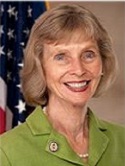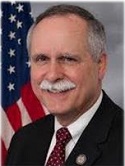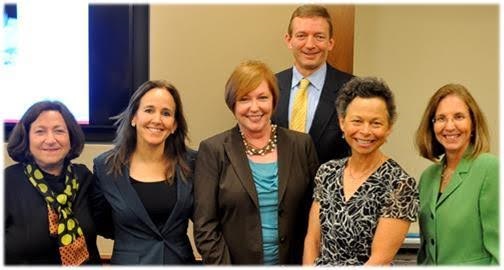WASHINGTON, DC, June 17, 2015 — The Friends of the Congressional Hearing Health Caucus (FCHHC) hosted a Briefing Luncheon on June 11 that examined programs designed to improve outcomes for children who are born deaf or hard of hearing. The Briefing featured presentations by Brenda Fitzgerald, MD, Commissioner of the Georgia Department of Public Health (DPH), and Dana Suskind, MD, Professor of Surgery and Pediatrics at the University of Chicago School of Medicine. Rep. David McKinley (R-WV), Hearing Caucus Co-Chairman, and Rep. Lois Capps (D-CA), one of the lead sponsors of HR1344, a bill to reauthorize the Early Hearing Detection and Intervention (EHDI) program, also spoke during the event that was attended by 100 Congressional staffers and hearing health champions.


Rep. Lois Capps and Rep. David McKinley
Rep. McKinley noted that hearing screening and follow-up is critical since “the failure to provide early intervention can compromise a child’s social development, communication skills, educational achievement and career goals.” Rep. Capps noted that “the work in support of EHDI is not done, since the CDC reports that 36% of newborns who fail their initial screening do not receive appropriate follow‑up care.”
The speakers focused on efforts to follow-up with children who are born deaf or hard of hearing to insure the best outcome possible, including a review by Dr. Fitzgerald of the 100 Babies Project in Georgia. Studies by Dr. Christine Yoshinaga-Itano at the University of Colorado have demonstrated that early identification and intervention services to develop language in deaf and hard of hearing children are successful in maintaining a successful path to age–appropriate literacy skills, and Georgia’s efforts focus on these critical early months.
Dr. Fitzgerald noted that “before the 100 Babies Project, only 22% of the deaf and hard of hearing 3rd graders in Georgia were at the appropriate level on standardized tests, so a large coalition of partners was brought together to develop a pathway to language and literacy for all of Georgia’s deaf and hard of hearing children.” The goal is complete screening by one month, diagnosis by three months, and intervention by six months. Every child is eligible for the 100 Babies program, and each enrolled child is given a testing identification number so they can be followed in the longitudinal data base and given a birth to literacy plan. Dr. Fitzgerald notes that “this should make transition between agencies and services seamless and more effective.” The first “100 babies” will be followed to analyze the results of the statewide, co-operative language development program.
Dr. Suskind focused on the progress made through EHDI programs, and noted that “this is a golden age for children who are deaf or hard of hearing.” She noted that Universal Newborn Hearing Screening and technological developments and improving educational resources have improved deaf and hard of hearing children’s access to language, as well as their achievement of age-appropriate skills. Dr. Suskind noted that 80-85 percent of the physical brain develops in the first three years of life, which make this period especially crucial to the development of sign or spoken language.
Dr. Suskind also discussed the Thirty Million Words® initiative that she founded to focus on the importance of early exposure to language. A landmark study by Hart & Risley (1995) demonstrates that by age 4, children in professional families hear, on average, thirty million more words than children from families in poverty. Thirty Million Words® helps parents enhance their home language environment in order to optimize their children’s brain development and, therefore, their ability to learn. The program is an extension of Dr. Suskind’s Project ASPIRE, which she created to help her deaf and hard of hearing patients from disadvantaged backgrounds work to reach their full language potential.

FCHHC Event Organizers & Speakers (from left): Donna Sorkin, ACIA; Dr. Dana Suskind, Univ. of Chicago; Dr. Brenda Fitzgerald, GA Dept of Public Health; Andy Bopp, HIA; Barbara Raimondo, CEASD; and Susan Boswell, AG Bell.
Newborn hearing screening programs have been implemented in all 50 states with funding provided by Congress through the EHDI program that was first authorized in 2000. EHDI programs include hearing screenings at birth, diagnostic evaluations to confirm hearing status, and early intervention including medical services, early intervention programs and family support. When EHDI was first approved in 2000, only 44 percent of newborns had their hearing screened; however, the implementation of EHDI nationwide has resulted in nearly universal hearing screening at birth with 98 percent of newborns screened. Reps. Brett Guthrie (R-KY) and Lois Capps (D-CA) are championing HR1344 to reauthorize EHDI this year.
FCHHC hosts periodic events for hearing health champions and supporters in Congress. The group is planning a tour of the National Institute on Deafness and Other Communication Disorders (NIDCD) on August 20 and a Hearing Screening Reception in the Rayburn House Office Building on October 21. Contact abopp@bostrom.com for more details.

